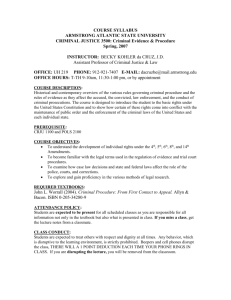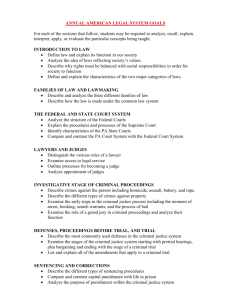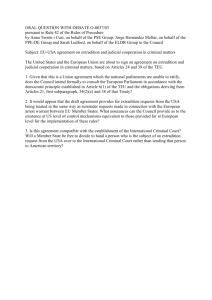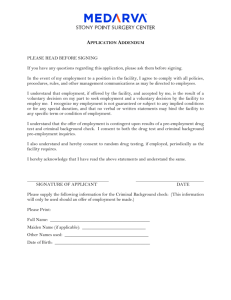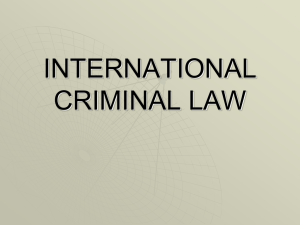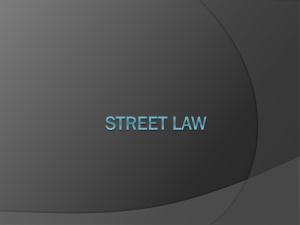crju/pols 5500 - law and legal process
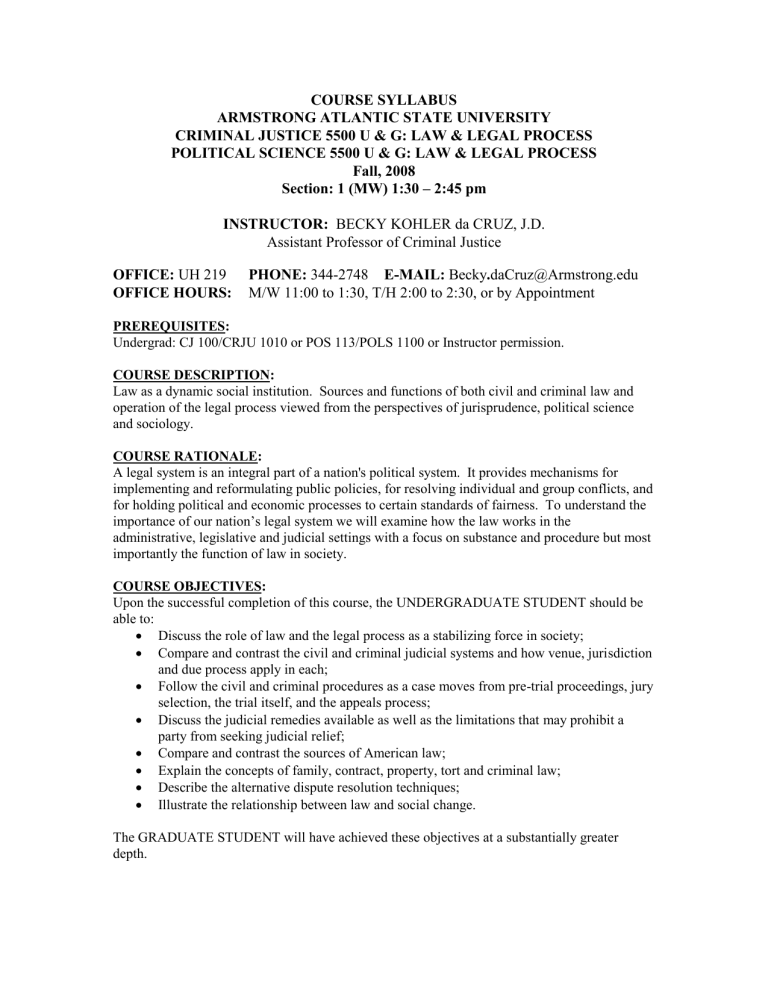
COURSE SYLLABUS
ARMSTRONG ATLANTIC STATE UNIVERSITY
CRIMINAL JUSTICE 5500 U & G: LAW & LEGAL PROCESS
POLITICAL SCIENCE 5500 U & G: LAW & LEGAL PROCESS
Fall, 2008
Section: 1 (MW) 1:30 – 2:45 pm
INSTRUCTOR: BECKY KOHLER da CRUZ, J.D.
Assistant Professor of Criminal Justice
OFFICE: UH 219 PHONE: 344-2748 E-MAIL: Becky .
daCruz@Armstrong.edu
OFFICE HOURS: M/W 11:00 to 1:30, T/H 2:00 to 2:30, or by Appointment
PREREQUISITES:
Undergrad: CJ 100/CRJU 1010 or POS 113/POLS 1100 or Instructor permission.
COURSE DESCRIPTION:
Law as a dynamic social institution. Sources and functions of both civil and criminal law and operation of the legal process viewed from the perspectives of jurisprudence, political science and sociology.
COURSE RATIONALE:
A legal system is an integral part of a nation's political system. It provides mechanisms for implementing and reformulating public policies, for resolving individual and group conflicts, and for holding political and economic processes to certain standards of fairness. To understand the importance of our nation’s legal system we will examine how the law works in the administrative, legislative and judicial settings with a focus on substance and procedure but most importantly the function of law in society.
COURSE OBJECTIVES:
Upon the successful completion of this course, the UNDERGRADUATE STUDENT should be able to:
Discuss the role of law and the legal process as a stabilizing force in society;
Compare and contrast the civil and criminal judicial systems and how venue, jurisdiction and due process apply in each;
Follow the civil and criminal procedures as a case moves from pre-trial proceedings, jury selection, the trial itself, and the appeals process;
Discuss the judicial remedies available as well as the limitations that may prohibit a party from seeking judicial relief;
Compare and contrast the sources of American law;
Explain the concepts of family, contract, property, tort and criminal law;
Describe the alternative dispute resolution techniques;
Illustrate the relationship between law and social change.
The GRADUATE STUDENT will have achieved these objectives at a substantially greater depth.
REQUIRED TEXTBOOK:
Melone, Albert P. & Allan Karnes (2003). The American Legal System: Foundations,
Process, and Norms . Los Angeles, CA: Roxbury.
READING ASSIGNMENTS:
Week #1
Week #2
Introduction to the Course
Chapter 1: Law in Perspective
Chapter 2: Legitimacy & the Limits of Authority
Brief: Ben & Jerry’s Homemade, Inc. v. Coronet Priscilla Ice Cream
Corp . pg. 66-69
Week #3 Chapter 3: Court Organization & Jurisdiction
Brief: McCulloch v. Maryland pg. 93-99
Week #4
Week #5
Week #6
Week #7
Week #8
Week #9
Week #10
Chapter 4: Judicial Interpretation & Decision-Making
Brief: Lake v. Wal-mart Stores, Inc
Exam 1
Chapter 9: Alternative Dispute Resolution
Exam 2
. pg. 128-132
Chapter 5: Civil Suits for Money Damages
Brief: Daubert v. Merrell Dow Pharmaceuticals, Inc
Chapter 6: Equity Processes
Brief: Doe v. Anderson pg. 246-247
Chapter 7: Criminal Processes
Brief: Sheppard v. Maxwell pg 265-272
. pg. 198-204
Week #11
Week #12
Week #13
Week #14
Week #15
Chapter 10: Law of Torts
Brief:
Chapter 11: Property Law
Brief:
Taylor v. Gilmartin
Case briefs due
Chapter 12: Family Law
Brief:
Brief:
Brief:
O’Brien v. O’Brien
Chapter 13: Criminal Law
U.S. v. Hair
Paper Due
pg. 493-497
pg. 541-544
Chapter 14: Contract Law
Shields v. Gross
pg. 385-387
In the Matter of Albright pg. 443-445
pg. 563-567
Final’s Week
Exam 3
**Additional readings/handouts may also be assigned and related current legal issues discussed in class.
CLASS FORMAT:
This course will be conducted in a combination of Socratic method and lecture , with emphasis on student preparation and participation. Your participation in this course will be drawn out in the form of question and answer dialogs between the instructor and the students.
ATTENDANCE POLICY:
Students are expected to be present for all scheduled classes. You are responsible for all information not only in the textbook but also what is presented in class. If you miss a class , get the lecture notes from a classmate.
CLASS CONDUCT:
Students are expected to treat others with respect and dignity at all times. Any behavior, which is disruptive to the learning environment, is strictly prohibited. Beepers and cell phones disrupt the class, YOU MUST HAVE THEM TURNED OFF OR IN SILENT MODE. If you are disrupting the lecture for any reason, you will be removed from the classroom.
EVALUATION METHODS:
Both Undergraduate and graduate students will be required to complete the following:
1.
Case Briefs: Ten case briefs will be due Week #12 . See attachment for these cases.
2.
Class Presentation: Each student will be assigned to present the information in a designated chapter or case. See the attachment for the assignments.
3.
Critical Thinking Paper : Each student is required to prepare a 10-page research paper.
4.
Examinations: There will be three examinations during the weeks noted above .
Graduate students will additionally be required to do the following:
5. Book Review : A 10 page typed comprehensive book review is required. Due Week #14
6. Comprehensive Final: Must also complete a typed essay response to the open-book, take-home examination.
FINAL GRADE STANDARDS:
Undergraduates:
Case Briefs. . . . . . . . . . . . . 50 points
Graduates:
Case Brief . . . . . . . . . . . . . 50 points
Class Presentation . . . . . . .25 points
Paper . . . . . . . . . . . . . . . . . 75 points
Exam 1. . . . . . . . . . . . . . . 100 points
Class Presentation . . . . . . .25 points
Paper . . . . . . . . . . . . . . . . . 75 points
Exam 1 . . . . . . . . . . . . . . . 100 points
Exam 2 . . . . . . . . . . . . . . . 100 points
Exam 3 . . . . . . . . . . . . . . 100 points
450 points
Exam 2. . . . . . . . . . . . . . . .100 points
Exam 3 . . . . . . . . . . . . . . . 100 points
Comprehensive Final . . . .100 points
Book Review . . . . . . . . . . .100 points
650 points
You can earn a maximum of four hundred Fifty (450) points in this course for undergraduate students and six hundred fifty (650) points for graduate students. The approximate letter and numerical equivalents are as follows:
Grade
A
B
C
D
F
Undergrad.
Points
450-405
405-360
360-315
315-270
270-0
Grad.
Points
650-585
585-520
520-455
455-390
390-0
Percent
90-100%
80-90%
70-80%
60-70% below 60%
EXAMS:
There will be three examinations during the session. Each exam will be non-cumulative; that is, it will only cover class materials and the reading assignments from the date of the last exam. The exams will consist of multiple choice, short answer, and essay questions.
BOOK REVIEW (Graduate Students Only):
Graduate students will also review a book of their choice (in consultation with the instructor) on an issue(s) relating to class material. Reviews should be in-depth, thoughtful papers, approximately 10 pages in length, typed, and double-spaced. Writing style and referencing should adhere to scholarly guidelines. Book reviews should consist of an introduction, summary of the book, critique of the book, and should answer two questions: “How does this book ‘fit’ with other readings on the same topic?” and “How does this book contribute to law in society?” Application of the writings in the text are expected.
STANDARDS OF HONESTY:
The college experience is founded on the concepts of honesty and integrity. Dishonesty, cheating, and plagiarism will not be tolerated in this course . Plagiarism is representing someone else’s work as your own. It includes quoting or paraphrasing a secondary source without citing that source, or copying, buying, or stealing written work from another person or another source. All class writings must be a student’s own original work, created this semester for this particular course. Remember, plagiarism is not only immoral- it is illegal. Students who commit plagiarism or who cheat on an examination will receive a zero (0) for that work. If cheating and plagiarism continue, the student will receive a failing grade in the course. Such an offense will also become a matter of your academic record. So, DO NOT CHEAT!
MAKE-UP POLICY:
Students are expected to take exams and turn in their assignments on their assigned dates. Late briefs and papers WILL NOT be accepted for any reason. If you fail to take an exam on the designated date, your grade on the make-up exam will be reduced by 10 percent (1 letter grade).
A make-up exam will ONLY be given when the student, who has good reason for not taking the exam on the dedicated date, provides the professor advance notice or if the student has an extreme emergency. In no event will a make-up exam be given 1 week after the date in which it was given or upon the student’s return from the emergency.
EXTRA CREDIT POLICY:
Do not count on any extra credit in this course. You are expected to learn the core material as assigned. IF any extra credit is offered during the semester, it must be completed on or before the last day of class - it will not be accepted during exam week.
CASES TO BE BRIEFED
CIVIL PROCEDURE
Pennoyer v Neff 95 U.S. 714 [1877]
CRIMINAL LAW & PROCEDURE
Gideon v. Wainwright 372 U.S. 335 (1963)
CONTRACTS
Sullivan v O’Connor S. Ct. Mass. 1973
PROPERTY
Jordache Enterprises, v Levi Strauss U.S. D. Ct. NY, 1993
TORTS
Brown v. Kendall 60 Mass. 292 (1850)
PLUS
Five briefs from textbook which are covered in class – your choice which 5
PRESENTATION ASSIGNMENTS
25 Point Value
Charlotte Barrentine Chapter 1: Law in Perspective
Jenna Eagle
Alex Estridge
Chapter 2: Legitimacy & the Limits of Authority
Case Study:
Ben & Jerry’s Homemade, Inc. v. Coronet Priscilla Ice
Cream Corp . pg. 66-69
Josh Felice Chapter 3: Court Organization & Jurisdiction
Brief: McCulloch v. Maryland pg. 93-99 Catherine Hill
Sarah Johnson Chapter 4: Judicial Interpretation & Decision-Making
Case Study: Lake v. Wal-mart Stores, Inc . pg. 128-132 Jacquie Lamb
Kari McCarthy Chapter 5: Civil Suits for Money Damages
Case Study: Lake v. Wal-mart Stores, Inc . pg. 128-132
Gary Miller
Sheri Nolte
Harriet White &
Chapter 6: Equity Processes
Case Study: Doe v. Anderson pg. 246-247
Amanda Wilson
Dylan Wynn
Chapter 7: Criminal Processes
Case Study:
Case Study:
Sheppard v. Maxwell
Maryland v. Craig pg. 265-272
pg. 275-279
Annamaria Brancato Chapter 9: Alternative Dispute Resolution
Debbie Grubb
Jennifer Adams
Chris Buckner
Destiny Jerral
Paul Kauffman
Sarah Loskoski
Kimberly Reeve
Dana Spoto
Chapter 10: Law of Torts
Case Study:
Case Study:
Taylor v. Gilmartin
Chapter 11: Property Law
Christopher Levine Chapter 13: Criminal Law
pg. 385-387
In the Matter of Albright
Chapter 12: Family Law
Case Study: O’Brien v. O’Brien pg. 493-497
Case Study: U.S. v. Hair pg. 541-544
Chapter 14: Contract Law
pg. 443-445
Case Study: Shields v. Gross pg. 563-567
Antonio Young
Jordache Enterprises, v Levi Strauss U.S. D. Ct. NY, 1993

